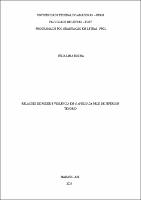| ???jsp.display-item.social.title??? |


|
Please use this identifier to cite or link to this item:
https://tede.ufam.edu.br/handle/tede/11256Full metadata record
| DC Field | Value | Language |
|---|---|---|
| dc.creator | Rocha, Júlia Lima | - |
| dc.creator.Lattes | https://lattes.cnpq.br/8128302619164328 | eng |
| dc.contributor.advisor1 | Zucolo, Nicia Petreceli | - |
| dc.contributor.advisor1Lattes | http://lattes.cnpq.br/4572857563677466 | eng |
| dc.contributor.referee1 | Silva, Elen Karla Sousa da | - |
| dc.contributor.referee1Lattes | http://lattes.cnpq.br/1872075310106458 | eng |
| dc.contributor.referee2 | Costa, Veronica Prudente | - |
| dc.contributor.referee2Lattes | http://lattes.cnpq.br/6783424840566423 | eng |
| dc.date.issued | 2025-08-28 | - |
| dc.identifier.citation | ROCHA, Júlia Lima. Relações de poder e violência em O avesso da pele de Jeferson Tenório. 2025. 86 f. Dissertação (Mestrado em Letras) - Universidade Federal do Amazonas, Manaus (AM), 2025. | eng |
| dc.identifier.uri | https://tede.ufam.edu.br/handle/tede/11256 | - |
| dc.description.resumo | A obra O avesso da pele (2020), ganhadora do prêmio Jabuti de 2021, escrita por Jeferson Tenório, é o objeto de estudo dessa pesquisa. No romance, Pedro, um homem negro, busca compreender (e contar) a história de seu pai, Henrique, assassinado em uma abordagem policial na cidade de Porto Alegre. O objetivo desta investigação é analisar a representação das relações de poder e violência no livro. Como parte do aporte teórico, utilizaram-se autores como Achille Mbembe (2018), bell hooks (2019), Carla Akotirene (2019), Cuti (2010), Fernanda Rodrigues (2019), Frantz Fanon (2020), Grada Kilomba (2019), Luiz Silvio de Almeida (2019), Pierre Bourdieu (2003), dentre outros. A partir das reflexões propostas pelos autores consideraram-se interpretações e análises possíveis para a narrativa. No capítulo um, ao observar Henrique vê-se uma personagem marcada pela violência simbólica e física, esta última tendo o assassinato como exemplo mais evidente. No capítulo dois, nota-se que Martha, Luara e Madalena são atravessadas pela violência não apenas racial, mas também de gênero e classe social. Já no capítulo três, vê-se que Pedro, narrador e personagem, também é atingido pela violência mesmo que nem sempre de forma direta, mas sim, como consequência daquelas sofridas por seus pais. A obra de Jeferson Tenório apresenta o protagonismo de pessoas negras, tirando-as do lugar de margem onde geralmente são historicamente postas na literatura brasileira. Nessa perspectiva, em O avesso da pele visualiza-se concretamente a discussão a respeito de temas que por séculos foram apagados da literatura, como a subjetividade da pessoa negra e o racismo. | eng |
| dc.description.abstract | The novel O avesso da pele (2020), winner of the 2021 Jabuti Award, written by Jeferson Tenório, is the object of study of this research. In the novel, Pedro, a Black man, seeks to understand (and narrate) the story of his father, Henrique, who was murdered during a police intervention in the city of Porto Alegre. The aim of this study is to analyze the representation of power relations and violence in the book. As part of the theoretical framework, the research draws on authors such as Achille Mbembe (2018), bell hooks (2019), Carla Akotirene (2019), Cuti (2010), Fernanda Rodrigues (2019), Frantz Fanon (2020), Grada Kilomba (2019), Luiz Silvio de Almeida (2019), Pierre Bourdieu (2003), among others. Based on the reflections proposed by these authors, possible interpretations and analyses of the narrative were considered. In Chapter One, through the observation of Henrique, one identifies a character marked by both symbolic and physical violence, the latter being most clearly represented by his murder. In Chapter Two, it is noted that Martha, Luara, and Madalena are subjected to violence not only of a racial nature but also of gender and social class. In Chapter Three, it becomes evident that Pedro, as both narrator and character, is likewise affected by violence—though not always directly, but rather as a consequence of the experiences endured by his parents. Jeferson Tenório’s work foregrounds the protagonism of Black individuals, removing them from the marginal position to which they have historically been relegated in Brazilian literature. From this perspective, O avesso da pele concretely materializes the discussion of themes that, for centuries, have been erased from literature—such as Black subjectivity and racism. | eng |
| dc.description.sponsorship | FAPEAM - Fundação de Amparo à Pesquisa do Estado do Amazonas | eng |
| dc.format | application/pdf | * |
| dc.thumbnail.url | https://tede.ufam.edu.br/retrieve/88802/DISS_JuliaRocha_PPGL.jpg | * |
| dc.language | por | eng |
| dc.publisher | Universidade Federal do Amazonas | eng |
| dc.publisher.department | Faculdade de Letras | eng |
| dc.publisher.country | Brasil | eng |
| dc.publisher.initials | UFAM | eng |
| dc.publisher.program | Programa de Pós-graduação em Letras | eng |
| dc.rights | Acesso Aberto | - |
| dc.rights.uri | https://creativecommons.org/licenses/by-nc-nd/4.0/ | pt_BR |
| dc.subject | Negros na literatura | por |
| dc.subject | Racismo | por |
| dc.subject.cnpq | LINGUISTICA, LETRAS E ARTES | eng |
| dc.title | Relações de poder e violência em O avesso da pele, de Jeferson Tenório | eng |
| dc.type | Dissertação | eng |
| dc.contributor.advisor1orcid | https://orcid.org/0000-0001-8544-7925 | eng |
| dc.creator.orcid | https://orcid.org/0009-0007-1538-1423 | eng |
| dc.contributor.referee1orcid | https://orcid.org/0000-0003-3304-1469 | eng |
| dc.contributor.referee2orcid | https://orcid.org/0000-0002-2175-4165 | eng |
| dc.subject.user | Literatura negro-brasileira | por |
| dc.subject.user | Protagonismo negro | por |
| dc.subject.user | Racismo estrutural | por |
| dc.subject.user | Gênero | por |
| Appears in Collections: | Mestrado em Letras | |
Files in This Item:
| File | Description | Size | Format | |
|---|---|---|---|---|
| DISS_JuliaRocha_PPGL | 758.12 kB | Adobe PDF |  Download/Open Preview |
Items in DSpace are protected by copyright, with all rights reserved, unless otherwise indicated.




